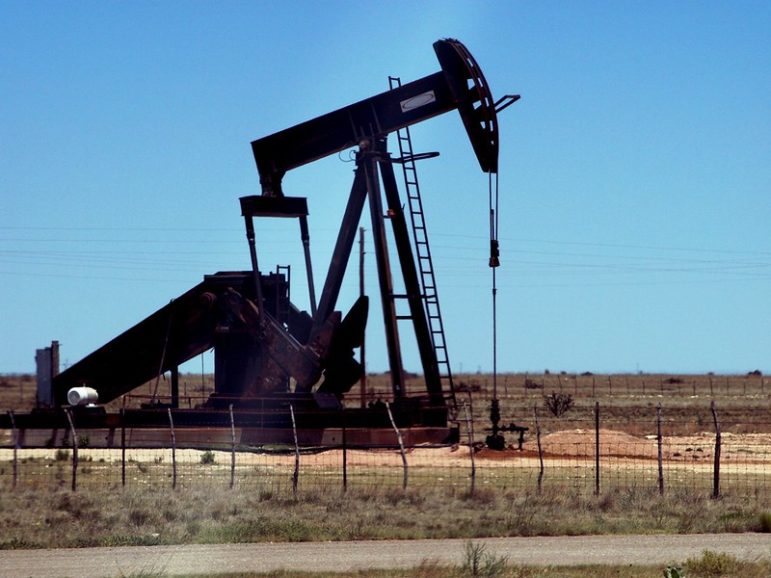
Beatnik Photos/Flickr
Oil pump jack in southeastern New Mexico in 2008.
Jade Collins really needs her driver’s license to get to her doctor’s appointments. She was 29 weeks pregnant in late May and also recovering from major back surgery. But New Mexico Motor Vehicle Division locations all over the state have been closed for weeks due to the COVID-19 pandemic. (They’re now open by appointment only.)
Instead, Collins, 19, has to rely on rides from her fiancé, who works all day, or her fiancé’s stepmom. She aged out of the state’s foster care system in January 2019 and splits her time between Hobbs and Lamesa, Texas, located a little over an hour east of Hobbs.
“I think more of the challenging parts of this pandemic is that it’s a lot harder for me to be able to go out and do what I need to do and get what I need done while it’s daylight,” Collins said. “Being housebound is hard.”
Collins is one area youth who is dealing with pandemic chaos. One of the biggest upheavals for some young people in Eddy and Lea counties is a lost job in the oil field industry and a high rent payment staring them in the face. However, resilient young adults like her have persevered, according to the Children, Youth and Families Department (CYFD), which has contacted more than 500 statewide former youth in care in an effort to prevent them from falling through the cracks.
Cassie Ruiz, a CYFD youth transition services worker based in Carlsbad, has helped a number of aged-out youth in Eddy and Lea counties negotiate the pandemic.
“It’s challenging to call a stranger and say, ‘Hey, we’re going to help you,’” Ruiz said. “They have no idea who we are. They’ve never seen us or met us … but so far everyone has been very, very patient. I think the kids appreciate the extra outreach.”
Some youths well-established
Michelle Williams, 19, of Hobbs has been able to keep her job as a health care assistant to the elderly during the coronavirus outbreak. However, the people she really wants to visit are off limits due to a risk of community spread.
“The biggest challenge is being separated from my siblings. I haven’t been able to see them at all. When I call them, it lasts 10 or 20 minutes and it’s not long enough for me,” Williams said. “I struggle a lot with my biological parents … I’ve been worried about them and tempted to go and check on them to make sure they’re OK.”
Williams is one of the youth contacted by Ruiz of Eddy County CYFD. In March, some statewide CYFD employees were delegated to reach out to youth who had aged out of foster care over the past seven years.
“We got a list of names and brief introductions and with some co-workers hit the ground running,” Ruiz said. “Some of them had lost contact with their workers and were difficult to find. We did a lot of outreach and social media searching looking for these youth. We’ve tracked a majority down.”
She and her team took a broad-stroke approach during introductory conversations with the youth. “It has been very intentional and specific to each client,” said Ruiz, who first asked young people about the resources and support systems that they might need or were already accessing.
[Related: NM Schools Providing Academic Coaches, School Packets, Food to Struggling Students]
[Related: Gallup Schools Hope For CARES Funding for Tech Purchases]
[Related: Pandemic Accelerated Rollout of Extended Foster Care ‘in Really Good Way’]
[Related: Mesilla Valley CASA Helping Youth Past CYFD Age Cutoff]
When the timing is right, Williams would like to move into her own place in Hobbs.
“In a little bit, I want to try to get my own little apartment and [CYFD] said they can help me as long as I can show that I’m paying a certain percentage for it,” Williams said. “I was wondering who do I talk to because that’s something I would like to take advantage of.”
“That’s something I can help you with,” Ruiz responded.
“Michelle has been very independent so it’s just been more about outreach and making sure that she’s accessing the resources that she needs,” Ruiz said. “It has been interesting to have conversations with some of these youth because a lot of them are well-established as adults and doing really well. That’s rewarding to hear.”
Oil field anxiety
Local organizations such as Southeast New Mexico Community Action Corporation (SNMCAC), United Way of Eddy County and Faith, Hope, and Love Foundation have proved indispensable for vulnerable youth and families by helping with rent payments and utility bills, Ruiz said.
“It’s a small community and it’s probably a pastime to complain about the oil fields, but at the same time, it brings a lot of revenue. Waitresses live on tips. Subway was hiring at $16 an hour. You don’t make that somewhere else,” she said.
“You can almost step out your front door and feel the anxiety in the air about what’s going to happen to the oil fields right now,” Ruiz continued. “A lot of people got used to those high incomes and when that bottoms out, especially young people, they don’t know what to do.”
Collins has been able to continue in-person doctor’s visits as she enters her third trimester. She has also been able to access some other services, though she admits that there’s only so much the state can do. “My daily life is weird, especially right now,” she said.
Overall, the strong-willed youth says she’s hanging in there and trying to stay positive. “Right now, I’m doing pretty good with what I’ve got,” she said.
This story is part of a Youth Today project on foster care in New Mexico. It’s made possible in part by the May and Stanley Smith Charitable Trust. Youth Today is solely responsible for the content and maintains editorial independence.

























